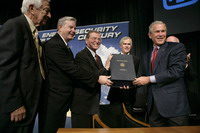US energy bill to control tax breaks and require increase in automobile fuel economy
House Democrats will ratify energy bill that would repeal billions of dollars in oil industry tax breaks and require a major increase in automobile fuel economy.

Details on a tax package totaling nearly $21 billion (14 billion EUR), about two-thirds of it on the major oil companies, was completed late Wednesday, clearing the way for a vote Thursday on the energy package.
House Speaker Nancy Pelosi, who has been deeply involved in crafting the legislation, was determined to get the bill through the House this week, with possible Senate action next week before lawmakers depart for the holiday recess.
Pelosi, a Democrat, surprised even some environmentalists by insisting that the measure include $13.5 billion (9.2 billion EUR) in taxes over 10 years on the five largest U.S. oil companies. The biggest portion would come from repealing tax breaks the oil companies received in 2004 that were designed to help U.S. manufacturing companies compete against foreign competitors. Most of the rest involves tax breaks provided in the 2005 energy bill.
In a letter Wednesday to the president's top economic adviser, Allan Hubbard, Pelosi defended "closing tax loopholes given to large oil and gas companies at a time that they are reporting record profits."
She said the money is needed to pay for tax incentives to spur renewable energy including credits for building cellulosic ethanol plants, advancing technology for carbon capture from coal plants, and tax incentives for energy conservation and efficiency programs.
Senate Republican leader Mitch McConnell said an energy bill could pass the Senate, but without the "twin millstones of tax hikes and utility bill increases around its neck."
The leader of the majority Democrats, Sen. Harry Reid, told reporters he will move quickly to take up the bill if it passes the House. When asked about its prospects, Reid said, "I don't know. We're going to try very hard."
The centerpiece of the legislation is a requirement for automakers to increase the fuel economy of cars, small trucks and SUVs by 40 percent over the next 13 years to an overall industry average of 35 miles per gallon (15 kilometers per liter).
Companies currently must meet a fleet average of 27.5 mpg (11.5 kilometers per liter) for cars and 22.2 mpg (9 kpl) for small trucks, including SUVs and vans.
It would be the first increase in the federal vehicle standard for cars in 32 years and reflected a compromise reached with Rep. John Dingell, a Michigan Democrat who is a staunch protector of the auto industry that is based in his state. Dingell obtained some concessions to help the industry, including an extension of credits toward achieving the mileage requirement if companies produce vehicles that can run on 85 percent ethanol.
The bill also calls for a huge increase in ethanol use as a motor fuel, requiring 36 billion gallons (136 billion liters) be used by 2022, a sevenfold jump from existing requirements. About-two thirds of it is to be from cellulosic feedstock such as prairie grass and wood chips, instead of corn.
For the first time, Congress would require electric utilities nationwide to produce 15 percent of their electricity from renewable energy such as wind, solar or biomass. More than two dozen states already have a renewable fuels requirement for electric utilities, and critics of the national mandate argue that some areas such as the Southeast don't have the renewable resources to meet the bill's requirement.
The energy proposals have been the subject of intense lobbying for weeks.
The electric power industry, led by the Edison Electric Institute, which represents investor-owned utilities and the Atlanta-based Southern Co., has argued to lawmakers that the renewable fuels requirement would lead to higher electricity costs.
The American Petroleum Institute, which represents the major oil companies, has argued that the new oil taxes would cause companies to cut back on investments for producing oil and expanding refineries.
And the ethanol requirement "sets up a new crazy-quilt of boutique biofuels that could strain, indeed break, the nation's fuel supply system," API President Red Cavaney wrote to House members.
Supporters of the mandate on utilities cite studies that show use of more renewable fuels would reduce demand on natural gas and could be expected to lower power costs. Meanwhile, an analysis by the congressional Joint Economic Committee, disputed claims that repeal of the oil tax breaks would discourage investment in production, or have an impact on energy prices.
The wind and solar energy companies, meanwhile, have pressed lawmakers to extend tax credits about to expire, and environmental groups have argued for the higher auto fuel efficiency standards and renewable fuels use by electric utilities.
Subscribe to Pravda.Ru Telegram channel, Facebook, RSS!





